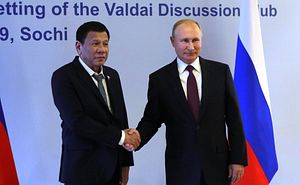A week before the start of the country’s third annual Kamandag (Venom) military exercises with the United States, Philippine President Rodrigo Duterte, in his second visit to Russia, reaffirmed his administration’s foreign policy thrust. In his speech at the Valdai Discussion Club at Sochi, he also outlined challenges to the global order.
While his shabby fashion sense and bombast during the open forum got much coverage, few paid serious attention to the substance of his address. Duterte’s remarks at Sochi are significant as they signal a commitment to expand and diversify Philippine diplomacy. The speech is also a useful gauge to ascertain how comparable developing countries are reacting to emerging global shifts in the balance of power and the rise of a multipolar world order.
Duterte is keen on transforming the Philippines’ international relations, which have hardly stepped out from the shadows of the Cold War. Relations with Russia, for instance, a possible partner for energy, space, infrastructure and defense, remain stunted. He described this as “an oversight of strategic proportion. A result of bureaucratic inertia. A symptom of blind attachment to bygone views and assumptions. And a massive failure to grasp change and seize new opportunities.” He vowed to correct this flaw.
Duterte identified two key challenges to the postwar liberal world order, the Pax Americana: The mix of exceptionalism and double standards and geopolitical shifts. He argued that some countries created global rules and norms, but refused to be bounded by them. He cited the Law of the Sea Convention, Paris Agreement on Climate Change and Convention on the Rights of the Child which the United States, for instance, has yet to ratify. The Filipino leader also criticized the disastrous implications of weaponizing human rights to justify intervention in other countries like Iraq and Libya.
The former Davao mayor also narrated his country’s bad experience with Western countries (e.g. United States and Canada) which backtracked from defense contracts over human rights concerns, while supplying more sophisticated arms “to parties whose actual human rights record leaves so much to be desired.” For instance, lucrative arms deals with non-democratic Middle East countries, some of which were criticized for their violent repression during the Arab Spring, continued. Mexico, Colombia and Central American countries which are also waging their own respective drug wars continue to get U.S. backing despite cases of rights abuses. Meanwhile, as its arms purchases were blocked or suspended, Manila is pressured to forego seeking other suppliers, such as from Russia or China. He described this as clipping his country’s wings as it fights criminality and builds a credible external defense. Duterte, along with several Filipino senators, also objected to a travel ban proposed by two U.S. lawmakers against Filipino officials involved in the detention of Senator Leila de Lima, a known Duterte critic. Manila saw this as a brazen intrusion into its domestic affairs.
Nonetheless, despite his tirades, Duterte clarified that he is not against the United States or the West. He recognized the United States as his country’s close friend and treaty ally with which it has deep people-to-people ties and shared values. He even said that “America certainly can offer so much more [to] the world.” He explained that he is not against liberalism in both politics and economy, saying that this philosophy “creates the best pathways to a just and fair society.” He said his country does not seek special treatment, favors or exemption from established norms and principles. Instead, he pleaded for respect for sovereignty, non-interference, and peaceful resolution of disputes. He argued that cooperation without precondition is the key to resolving global threats, such as terrorism, migration and refugees, climate change, pandemics and shortages of vital resources.
In recognition of evolving global geopolitical shifts, Duterte wanted to expand relations with countries outside the traditional radar of Philippine diplomacy. He promised to cultivate ties with Central Asia, Africa, and Latin America. He also challenged Filipino diplomats to look at the Middle East beyond the prism of oil and overseas workers. He said that “parochialism and isolationism have no place in a world that is getting smaller and smaller by the day.” Duterte expressed support for reforms in the United Nations for it to be more responsive to changing times. As major power rivalry intensifies, he called on fellow countries from the global South to choose non-alignment to remain relevant. “More than making our voices heard on issues that deeply affect [us], we must act together,” he added.
As one of the world’s fastest growing economies, Duterte said that while sustaining growth, the Philippines will take its responsibility of helping other developing countries. In fact, throughout its history, the country never let its level of economic development serve as an impediment for it to welcome refugees fleeing war, such as Jews, Russians, and Vietnamese. The country had been providing affordable English language and medical education to Koreans, Indians, Iranians, among others.
Some people may question the selection of the venue or simply dismiss Duterte as an ungrateful anti-West leader unable to outgrow memories from his country’s bitter colonial past. But beyond the rough rhetoric and poor optics lie the yearning to carve an independent foreign policy and a desire to steer his country in a time of flux.
Lucio Blanco Pitlo III is a research fellow at the Asia-Pacific Pathways to Progress Foundation. His research interests include maritime and connectivity issues and Southeast Asia’s interaction with major powers.

































